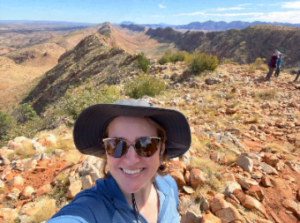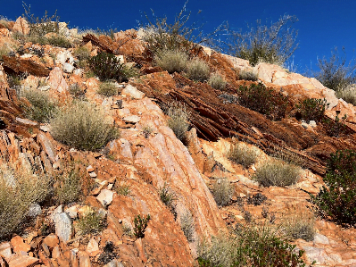From the top of the summit, the ragged seams of rocky mountain ranges formed millenia ago stretched out in front of me. And to the sides. And, if I swirled around carefully with my hiking poles, they were behind me too. Looking out over this spectacular view was especially poignant, because I’d just climbed 8 kilometres to the top to watch dawn break over the landscape. I was on the top of Rwetyepme (Mount Sonder), the Northern Territory’s fourth highest peak, having somehow convinced myself to go on a 128km trek along the Larapinta Trail with a group of 9 feisty women I had never met from my walking club.

8 nervous kilometres up a mountain in the predawn darkness sounds like a lot. 128 sweaty kilometres along a mountain range sounds like a lot more. And yet my journey was even further, because just two years prior, I’d broken my fibula clean through, and even touching the ball of my foot to the carpet was agony. After the initial weeks of pain settled, and the months of rehab and crutches and irritation wore on, I decided I needed to set myself what felt at the time like a seemingly unachievable goal, and book the trip. Even walking a few metres seemed unachievable, so really, what was a few more thousand?
Larapinta was gorgeous. A landscape appearing at once to be dry and sparse, which over 9 days closer inspection, became apparent was full of life, blooms, colour and history. Constructed by prison labourers in 1989, and only recently opening in its full length in 2002, the trail runs 233 kilometres across the ridgelines of the West MacDonnell Ranges, passing through various lands long cared for by four different Indigenous peoples. Having permission from Traditional Custodians to walk this special place was something we reflected on often, and didn’t take lightly.

It was a living rockscape that we couldn’t stop admiring, even despite the relentless uphill and downhill grind over 9 days, the blisters taped over and over with multitudes of varicoloured bandaids and tape, and the daily ponderings each of us no doubt had on why we had willingly chosen hiking as a hobby. The nightmare stacks of shifting, wobbling, slippery shale and quartzite; rocks upon rocks upon rocks.
I was the youngest by far, and this group of incredibly tough women who were determined to keep walking over multitudes of rock types, buoyed each other up through shared adventure and tiredness. One foot in front of the other, at times unsure why we had thrown ourselves into this scenario, only to be reminded why when we reached the end of each day and reflected back on how far we had walked. Reaching the Finke River each afternoon, the oldest river in the world, to plunge into the icy water and rinse off the day’s dust and struggles.
What a privilege to walk this trail and to partake in this experience. And yes, you guessed it, I’m now planning my next journey. Putting one foot in front of the other, who knows where it will take us!

About Alice Coulson
Experienced in project management, strategic communication and the development and implementation of engagement projects, Alice – our Engagement Lead – is a natural communicator and rapport builder with an engaging style. People are her passion, and facilitating discussions in communities all over Victoria brings her big joy! Personable and organised, she loves to deliver high-quality and thoughtful engagement outcomes for clients, and is experienced at managing projects co-delivered with multiple consultancies.


